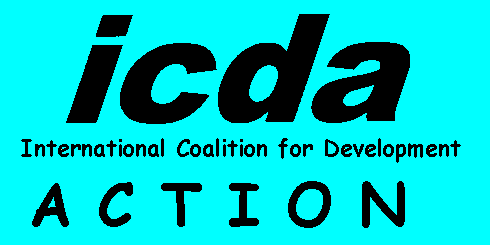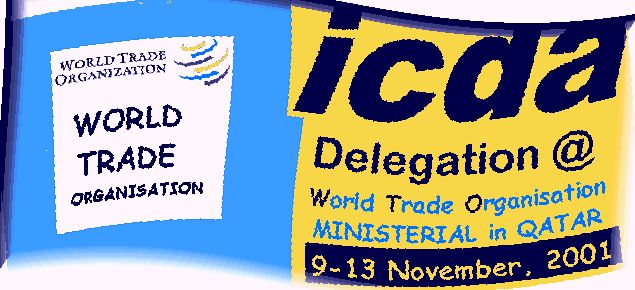
This site is best viewed with
| ICDA LATEST |
ICDA Latest News
Programme areas
ICDA History
| ICDA MEMBERS |
Current Members
| WTO IMPACT LIST |
Subscribe Here
What do you think?
| CENNT |
Latest News
IWGGT (in construction)
| PUBLICATIONS |
Latest ICDA Journal (in construction)
Latest ICDA Update (in construction)
| VACANCIES |
Internship
Book Keeper/Part time administrative Assistant
| HELP |
FAQ's
About Us
Contact Us

| LDCS >> FOUR REASONS WE SHOULD NOT PAY OUR DEBTS |
| By: The Nation (Nairobi) Journalist, Mutuma Mathiu |
"The IMF has generally favoured policies which encourage us to export commodities, some of them, such as minerals, non-renewable resources. The spirit is willing, but the prices are bad"
The "milk of human kindness" flows sparingly - very sparingly - in this world. Therefore, the expectation that Africa's debt will be forgiven because it is so poor, wracked by Aids and generally the most miserable spot on the face of the earth, is a little optimistic.
Equally, if we have squandered other people's money, then we should pay it back. The only way we can justify not doing so is if we can prove that the debt is in any way fraudulent and, therefore, illegitimate. A word of caution, though. The arguments presented here are mere speculation aimed at provoking debate.
Were we to default on our obligations, we would quite simply be pulverised. Aside from the very real possibility of American Marines hitting the beach at Shimanzi - it is a time-honoured tradition to interfere in the politics of a country that refuses to pay - we'd become a pariah, the object of international calumny. There'd be no more loans, no more grants, no more foreign investment, no more trade concessions. We'd become, well, like the Libyans.
All the same, here are the debt campaigners hottest arguments:
Can't pay, won't pay: You probably don't know this, but, by 1996, we owed $6.9 billion (Sh551,440,000,000. Don't ask me what we did with it: I'm not in Kanu). In the same year, we spent $840 million (Sh6.8 billion) servicing our debts, four times more than we spent on health. Debt servicing was the most expensive item on the budget, more expensive than even education, which was allocated a whole 6.8 per cent of the GNP.
Today, the Blair government is seeking re-election on the promise that it won't cut spending on social services. As a matter of fact, Labour is arguing that the Tories shouldn't be elected because they would cut social spending to fund an "irresponsible tax cut".
It is these very same governments that are telling us to allow our people to die of curable diseases because of crazy health and education budget cuts.
The fact is, we will never get out trouble unless we invest heavily in health, law and order and education. Are we willing to mortgage the future of this country to pay debts?
What's more, it is not our fault. Most Third Worlders are the innocent victims of loan pushers and the stupidity of their politicians.
But the money was lent on a variable rate of interest, usually 1 per cent above the US rate. Then came Ronald Reagan with his homespun humour and anti-Communist talk about the Evil Empire. To fund military expansion without raising taxes for the rich (Reagan was a good Republican, after all), the Reagan administration raised interest rates to attract money from Germany and Japan.
Secondly, our ability to pay was compromised by the conditions imposed by the debt collectors. The IMF has generally favoured policies which encourage us to export commodities, some of them, such as minerals, non-renewable resources. In 1988, the prices of 20 of the leading commodities - including our sugar, tea and coffee - were 40 per cent less than in 1974. The spirit is willing, but the prices are bad.
Precedent. In any system that pretends to fairness, it is generally a powerful argument to demand that what has been done unto others be done unto you, which is another way of saying that defaulting on debts is nothing new.
I have unearthed these examples from Europe and America of debtors who defaulted and got away with it.
In 1327, King Edward III refused to pay money owed to Italian banks, the result of which the banks of Bardi and Perizzi went phut. Four hundred years later, British banks were major lenders to American states. Many defaulted, the banks rolled up their sleeves and shovelled the manure of state politics. They made sure friendly voices were elected, which voices raised taxes to pay the debt.
They succeeded in all but one state. Almost 150 years later, the banks are still demanding their money from the state of Mississippi.
In 1997, the US Treasury revealed that European countries owed the US more than $33 billion dating back to the First World War. Britain owes $14.6 billion (twice what we owe all our creditors), France $11 billion and Italy $3.2 billion.
In 1923, the US extended Britain's repayment period to 60 years and cut the rate of interest. Britain still didn't pay and looks as if it never will. Of course, this is bilateral debt. Commercial debt is a different ball game altogether.
International law. There are two doctrines, a lot of things being equal, that can illegitimise a state's debt. The first is the so-called principle of odious debt, according to which, "if the debt of the predecessor is odious (i.e., the proceeds of the debt were used against the interests of the local population), then the debt may not be chargeable to the successor".
If an illegitimate government borrows and uses the money to oppress the people, then the government that replaces it has no obligation to pay. Why should South Africans repay debts borrowed to kill them by an apartheid government they didn't elect?
The second is the whole question of "moral hazard". To quote the IMF, "Moral hazard exists when the provision of insurance against risk encourages behaviour that makes that risk more likely to occur."
In other words, those who lent knowing full well the debtor couldn't pay but depended on the IMF to force payment deserve to lose their money.
----------------------------------------------------------------------------
Copyright © 2001 The Nation. Distributed by AllAfrica Global Media
Please click here to go back to WTOMC Page
Copyright ©E.K.BENSAH II PRODUCTIONS. 1998-2001